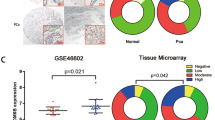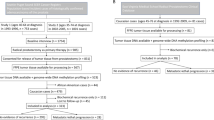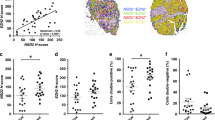Abstract
Background:
Promoter hypermethylation is an important epigenetic mechanism in the regulation of several key modulators of prostate carcinoma progression. Recent studies suggest that the polycomb-group (PcG) protein BMI1 may have an impact on epigenetic regulation of several targets, including the CDKN2a locus.
Methods:
In this study, we investigated the association of BMI1 expression, promoter methylation of CDKN2a (p16INK4a and p14ARF) and TMS1 with pathological variables (Gleason score, TNM stage, perineural invasion) in prostate cancer (PCa).
Results:
Methylation of p16INK4a and p14ARF revealed an inverse association with Gleason score 7b and Gleason score 6. No significant association could be demonstrated for BMI1 -overexpression and promoter methylation of p16INK4a, p14ARF and TMS1 as well as pT category.
Conclusions:
Our data suggest that the CDKN2a locus is a switch in PCa with methylation of p16INK4a being a marker for more aggressive tumours of Gleason score 7b, but no association with BMI overexpression was observed.
This is a preview of subscription content, access via your institution
Access options
Subscribe to this journal
Receive 4 print issues and online access
$259.00 per year
only $64.75 per issue
Buy this article
- Purchase on Springer Link
- Instant access to full article PDF
Prices may be subject to local taxes which are calculated during checkout




Similar content being viewed by others
References
Coleman MP, Gatta G, Verdecchia A, Estève J, Sant M, Storm H et al. EUROCARE-3 summary: cancer survival in Europe at the end of the 20th century. Ann Oncol 2003; 14 (Suppl 5): v128–v149.
Humphrey PA . Gleason grading and prognostic factors in carcinoma of the prostate. Mod Pathol 2004; 17: 292–306.
Epstein JI . An update of the Gleason grading system. J Urol 2010; 183: 433–440.
Wright JL, Salinas CA, Lin DW, Kolb S, Koopmeiners J, Feng Z et al. Prostate cancer specific mortality and Gleason 7 disease differences in prostate cancer outcomes between cases with Gleason 4+3 and Gleason 3+4 tumors in a population based cohort. J Urol 2009; 182: 2702–2707.
Bradford TJ, Tomlins SA, Wang X, Chinnaiyan AM . Molecular markers of prostate cancer. Urol Oncol 2006; 24: 538–551.
Duhagon MA, Hurte EM, Sotelo-Silveira JR, Zhang X, Farrar WL . Genomic profiling of tumor initiating prostatospheres. BMC Genomics 2010; 11: 324.
Goo YA, Goodlett DR . Advances in proteomic prostate cancer biomarker discovery. J Proteomics 2010; 73: 1839–1850.
Kron KJ, Liu L, Pethe VV, Demetrashvili N, Nesbitt ME, Trachtenberg J et al. DNA methylation of HOXD3 as a marker of prostate cancer progression. Lab Invest 2010; 90: 1060–1067.
Sathyanarayana UG, Padar A, Suzuki M, Maruyama R, Shigematsu H, Hsieh JT et al. Aberrant promoter methylation of laminin-5-encoding genes in prostate cancers and its relationship to clinicopathological features. Clin Cancer Res 2003; 9: 6395–6400.
Li LC, Carroll PR, Dahiya R . Epigenetic changes in prostate cancer: implication for diagnosis and treatment. J Natl Cancer Inst 2005; 97: 103–115.
Murphy TM, Perry AS, Lawler M . The emergence of DNA methylation as a key modulator of aberrant cell death in prostate cancer. Endocr Relat Cancer 2008; 15: 11–25.
Hoque MO . DNA methylation changes in prostate cancer: current developments and future clinical implementation. Expert Rev Mol Diagn 2009; 9: 243–257.
Ramirez ML, Nelson EC, Evans CP . Beyond prostate-specific antigen: alternate serum markers. Prostate Cancer Prostatic Dis 2008; 11: 216–229.
Jeronimo C, Henrique R, Hoque MO, Mambo E, Ribeiro FR, Varzim G et al. A quantitative promoter methylation profile of prostate cancer. Clin Cancer Res 2004; 10: 8472–8478.
Henrique R, Costa VL, Jeronimo C . Methylation-based biomarkers for early detection of urological cancer. Crit Rev Oncog 2007; 13: 265–282.
Hoffmann MJ, Engers R, Florl AR, Otte AP, Muller M, Schulz WA . Expression changes in EZH2, but not in BMI-1, SIRT1, DNMT1 or DNMT3B are associated with DNA methylation changes in prostate cancer. Cancer Biol Ther 2007; 6: 1403–1412.
van Leenders GJ, Dukers D, Hessels D, van den Kieboom SW, Hulsbergen CA, Witjes JA et al. Polycomb-group oncogenes EZH2, BMI1, and RING1 are overexpressed in prostate cancer with adverse pathologic and clinical features. Eur Urol 2007; 52: 455–463.
Fan C, He L, Kapoor A, Rybak AP, De Melo J, Cutz JC et al. PTEN inhibits BMI1 function independently of its phosphatase activity. Mol Cancer 2009; 8: 98.
Berezovska OP, Glinskii AB, Yang Z, Li XM, Hoffman RM, Glinsky GV et al. Essential role for activation of the Polycomb group (PcG) protein chromatin silencing pathway in metastatic prostate cancer. Cell Cycle 2006; 5: 1886–1901.
Breuer RH, Snijders PJ, Sutedja GT, Sewalt RG, Otte AP, Postmus PE et al. Expression of the p16(INK4a) gene product, methylation of the p16(INK4a) promoter region and expression of the polycomb-group gene BMI-1 in squamous cell lung carcinoma and premalignant endobronchial lesions. Lung Cancer 2005; 48: 299–306.
Dhawan S, Tschen SI, Bhushan A . Bmi-1 regulates the Ink4a/Arf locus to control pancreatic beta-cell proliferation. Genes Dev 2009; 23: 906–911.
Bracken AP, Dietrich N, Pasini D, Hansen KH, Helin K Genome-wide mapping of Polycomb target genes unravels their roles in cell fate transitions. Genes Dev 2006; 20: 1123–1136.
Kim JH, Yoon SY, Kim CN, Joo JH, Moon SK, Choe IS et al. The Bmi-1 oncoprotein is overexpressed in human colorectal cancer and correlates with the reduced p16INK4a/p14ARF proteins. Cancer Lett 2004; 203: 217–224.
Sasaki M, Ikeda H, Sato Y, Nakanuma Y . Decreased expression of Bmi1 is closely associated with cellular senescence in small bile ducts in primary biliary cirrhosis. Am J Pathol 2006; 169: 831–845.
Gil J, Bernard D, Martinez D, Beach D . Polycomb CBX7 has a unifying role in cellular lifespan. Nat Cell Biol 2004; 6: 67–72.
Benbrahim-Tallaa L, Waterland RA, Dill AL, Webber MM, Waalkes MP . Tumor suppressor gene inactivation during cadmium-induced malignant transformation of human prostate cells correlates with overexpression of de novo DNA methyltransferase. Environ Health Perspect 2007; 115: 1454–1459.
Bruggeman SW, Valk-Lingbeek ME, van der Stoop PP, Jacobs JJ, Kieboom K, Tanger E et al. Ink4a and Arf differentially affect cell proliferation and neural stem cell self-renewal in Bmi1-deficient mice. Genes Dev 2005; 19: 1438–1443.
Esteller M, Tortola S, Toyota M, Capella G, Peinado MA, Baylin SB et al. Hypermethylation-associated inactivation of p14(ARF) is independent of p16(INK4a) methylation and p53 mutational status. Cancer Res 2000; 60: 129–133.
Conway KE, McConnell BB, Bowring CE, Donald CD, Warren ST, Vertino PM et al. TMS1, a novel proapoptotic caspase recruitment domain protein, is a target of methylation-induced gene silencing in human breast cancers. Cancer Res 2000; 60: 6236–6242.
Herman JG, Graff JR, Myohanen S, Nelkin BD, Baylin SB . Methylation-specific PCR: a novel PCR assay for methylation status of CpG islands. Proc Natl Acad Sci USA 1996; 93: 9821–9826.
Klaes R, Friedrich T, Spitkovsky D, Ridder R, Rudy W, Petry U et al. Overexpression of p16(INK4A) as a specific marker for dysplastic and neoplastic epithelial cells of the cervix uteri. Int J Cancer 2001; 92: 276–284.
Kron K, Pethe V, Briollais L, Sadikovic B, Ozcelik H, Sunderji A et al. Discovery of novel hypermethylated genes in prostate cancer using genomic CpG island microarrays. PLoS One 2009; 4: e4830.
Widschwendter M, Fiegl H, Egle D, Mueller-Holzner E, Spizzo G, Marth C et al. Epigenetic stem cell signature in cancer. Nat Genet 2007; 39: 157–158.
Seligson DB, Horvath S, Shi T, Yu H, Tze S, Grunstein M et al. Global histone modification patterns predict risk of prostate cancer recurrence. Nature 2005; 435: 1262–1266.
Yu J, Rhodes DR, Tomlins SA, Cao X, Chen G, Mehra R et al. A polycomb repression signature in metastatic prostate cancer predicts cancer outcome. Cancer Res 2007; 67: 10657–10663.
Varambally S, Dhanasekaran SM, Zhou M, Barrette TR, Kumar-Sinha C, Sanda MG et al. The polycomb group protein EZH2 is involved in progression of prostate cancer. Nature 2002; 419: 624–629.
Glinsky GV . ‘Stemness’ genomics law governs clinical behavior of human cancer: implications for decision making in disease management. J Clin Oncol 2008; 26: 2846–2853.
Glinsky GV . Stem cell origin of death-from-cancer phenotypes of human prostate and breast cancers. Stem Cell Rev 2007; 3: 79–93.
Freedberg DE, Rigas SH, Russak J, Gai W, Kaplow M, Osman I et al. Frequent p16-independent inactivation of p14ARF in human melanoma. J Natl Cancer Inst 2008; 100: 784–795.
Brown VL, Harwood CA, Crook T, Cronin JG, Kelsell DP, Proby CM . p16INK4a and p14ARF tumor suppressor genes are commonly inactivated in cutaneous squamous cell carcinoma. J Invest Dermatol 2004; 122: 1284–1292.
Weber A, Bellmann U, Bootz F, Wittekind C, Tannapfel A . INK4a-ARF alterations and p53 mutations in primary and constitutive squamous cell carcinoma of the head and neck. Virchovs Arch 2002; 441: 133–142.
Esteller M, Corn PG, Baylin SB, Herman JG . A gene hypermethylation profile of human Cancer. Cancer Res 2001; 61: 3225–3229.
Kim WY, Sharpless NE . The regulation of INK4/ARF in cancer and aging. Cell 2006; 127: 265–275.
Fan C, He L, Kapoor A, Gillis A, Rybak AP, Cutz JC et al. Bmi1 promotes prostate tumorigenesis via inhibiting p16(INK4A) and p14(ARF) expression. Biochim Biophys Acta 2008; 1782: 642–648.
Acknowledgements
This work was funded in part by the Protein Research Unit Ruhr within Europe, PURE.
Author information
Authors and Affiliations
Corresponding author
Ethics declarations
Competing interests
The authors declare no conflict of interest.
Additional information
Supplementary Information accompanies the paper on the Prostate Cancer and Prostatic Diseases website
Supplementary information
Rights and permissions
About this article
Cite this article
Verdoodt, B., Sommerer, F., Palisaar, RJ. et al. Inverse association of p16INK4a and p14ARF methylation of the CDKN2a locus in different Gleason scores of prostate cancer. Prostate Cancer Prostatic Dis 14, 295–301 (2011). https://doi.org/10.1038/pcan.2011.45
Received:
Revised:
Accepted:
Published:
Issue Date:
DOI: https://doi.org/10.1038/pcan.2011.45



